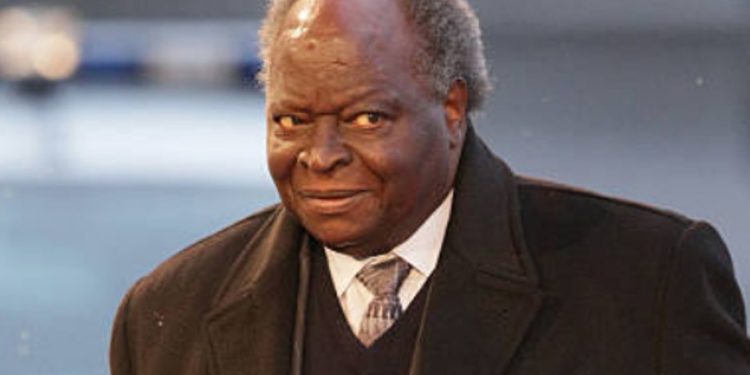Kenya’s third President Mwai Kibaki has passed on aged 90.
This was announced by President Uhuru Kenyatta, who said that KJibaki’s legacy of civic responsibility will continue to inspire generations of Kenyans long into the future.
“Mwai Kibaki earned the abiding respect and affection of the people of this Nation and other nations throughout the world. President Kibaki will be forever remembered as the gentleman of Kenyan Politics, a brilliant debater; whose eloquence, wit, and charm won the day, timeand-time again. His contributions in the Ministry of Finance and as Vice President saw Kenya’s economy grow steadily, fueled by a commodities boom, and fiscal and monetary policies that were the backbone of his economic philosophy,” said Kenyatta.
In all his life, Kibaki worked as a university lecturer, a legislator, Member of Parliament for Five Decades, a Cabinet Minister, Vice-President, Official Leader of Opposition and finally as the Third President of the Republic of Kenya.
In the 1963 elections, became the Donholm Constituency MP (subsequently called Bahati and now known as Makadara). He has been a member of parliament (MP) ever since.
He was appointed Assistant Minister of Finance and chairman of the Economic Planning Commission in 1963, before he was promoted to Minister of Commerce and Industry in 1966. In 1969, he became Minister of Finance and Economic Planning where he served until 1978. Moving his political base from Nairobi to his rural home, he was re-elected to parliament in 1974 to represent his native Othaya Constituency.
When Daniel arap Moi succeeded Jomo Kenyatta as President of Kenya in 1978, Kibaki was elevated to the Vice Presidency, but was allowed to keep the Finance portfolio, which he exchanged for that of Home Affairs in 1982. Kibaki fell out of favor with President Moi in 1988, was dropped as Vice President and moved to the Ministry of Health.
In December 1991, only days after the repeal of Section 2A of the constitution, which restored the multi-party system, Mwai Kibaki left KANU and founded the Democratic Party (DP). He came in third in the presidential elections of 1992, and was second in the 1997 elections.
In January 1998, Mwai Kibaki became the leader of the official opposition with the Democratic Party being the official opposition party.
In preparation for the 2002 elections, Kibaki’s Democratic Party affiliated with several other parties to form the National Alliance Party of Kenya (NAK). NAK allied itself with the Liberal Democratic Party (LDP) to form the National Rainbow Coalition (NARC). On December 27, 2002, NARC won a landslide victory over KANU. Kibaki got 62 percent of the votes in the presidential elections, against only 31 percent for the KANU candidate, Uhuru Kenyatta.














